The Guardian remained in the news cycle this week after being unable to quell the furor that erupted after it published a blatantly antisemitic cartoon about the outgoing BBC chairman Richard Sharp.
Despite priding itself on its progressive politics and routinely lambasting rival UK news outlets for what it perceives as racism and bigotry, it is clear that Guardian editors have something of a blindspot when it comes to Jews, having failed to see why readers might find offensive the sketch of a hooked-nose Sharp hoarding a pile of gold alongside a vampire squid.
While The Guardian later took down the cartoon by Martin Rowson, there was a clue to its level of regret in the half-hearted and painfully short apology posted on its website: “A cartoon (published in the newspaper on 29 April 2023, and online the day before) about the resignation of the BBC chairman, Richard Sharp, did not meet our editorial standards, and we decided to remove it from our website. The Guardian apologises to Mr Sharp, to the Jewish community and to anyone offended.”
Indeed, it is more than likely that The Guardian feels it was undeserving of such public opprobrium given the fact that the latest editorial misstep bears an uncanny resemblance to many others before it.
The fact is, the publication has an unfortunate history of printing derogatory cartoons about Jews — many of which were intended to be critical of the State of Israel — and then refusing to recognize the antisemitic undertones within the sketches when they are criticized.
Here are some of the worst that have been published over the years:
Untitled by Steve Bell – February 7, 2001
Ostensibly a reference to the Sabra and Shatila massacres by the Israeli-allied Lebanese Christian militia during the 1982 Lebanon War, The Guardian referenced a visit by Ariel Sharon to the Western Wall, which was custom after an election victory.
Carrying the headline, “Sharon Twists Knife in Muslim Wounds,” the newspaper grotesquely depicted Sharon’s bloody handprints on the Jewish holy site and in doing so strayed into brash antisemitism territory.

Escalation by Martin Rowson – March 6, 2002
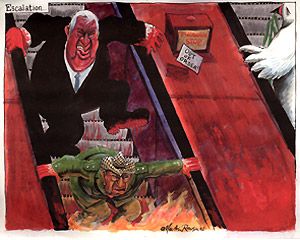
Depicting a bloody and bruised Yasser Arafat being kicked down a bloodsoaked escalator into flames, Martin Rowson’s take on the Israeli siege on the late PLO leader’s compound in Ramallah served to completely distort the events that took place.
Arafat was not a victim being unfairly brutalized by Israel, but rather he was the chief instigator behind the countless suicide attacks that rocked Israel during the Second Intifada, including the Passover massacre in Netanya that left 30 civilians dead just days before the raid was launched.
The Promise of The Past by Steve Bell – March 25, 2009
Using the famous British wartime poster encouraging men to enlist, Bell was at again in 2009 with his take on the 2008-2009 Gaza War, which depicts an IDF soldier with his daughter on his lap asking, “Daddy, what did you do in Gaza?”
Unlike some of his previous cartoons, Bell was subtle in this attempt to portray the Israeli army as ruthless and bloodthirsty killers — unlike the original image, the soldier is shown noticeably pale with demonic dark eyes that give the appearance of a ghoul.
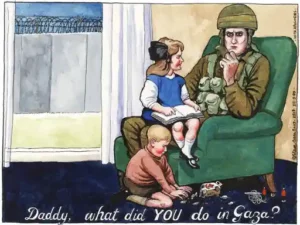
Steve Bell on Tony Blair and William Hague’s Role in Israel-Gaza Clash – November 15, 2012

The depiction of Jews as secretly controlling the world via both its financial institutions and by exerting influence over naive politicians is a well-known antisemitic trope.
Yet, The Guardian apparently ignored how a cartoon of Israeli Prime Minister Benjamin Netanyahu depicted as a supremely powerful puppetmaster controlling British lawmakers might be perceived, and defended the sketch amid reader complaints. At the time, the newspaper’s readers’ editor Chris Elliott actually agreed it showed poor judgment on Bell’s part but argued he did not believe the cartoonist was antisemitic.
“However, using the image of a puppeteer when drawing a Jewish politician inevitably echoes past antisemitic usage of such imagery, no matter the intent,” he added. “While journalists and cartoonists should be free to express an opinion that Netanyahu is opportunistic and manipulative, in my view they should not use the language – including the visual language – of antisemitic stereotypes.”
Steve Bell on Events in the West Bank This Week – July 2, 2014
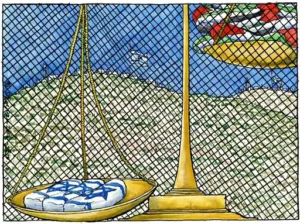
Bell let his evidently deep-seated hatred of Israel slip into his work again in 2014 when he sketched a “commentary” about the funeral of the three Israeli teens who were murdered by Hamas terrorists.
Depicting a giant scale with the flag-covered bodies of three Israeli youths outweighing a larger number of flag-covered Palestinian bodies, the piece appeared to suggest that people care too much about the teens when more Palestinians had died in the conflict.
What Bell failed to convey in his twisted cartoon was that the murdered Israelis were innocent kids who were kidnapped on their way home from school, while the majority of Palestinians killed were combatants.
Steve Bell on Labour’s Antisemitism Woes – October 29, 2020
Hours after former Labour Party leader Jeremy Corbyn was suspended from the party over his response to the Equality and Human Rights Commission’s excoriating report on antisemitism within the Labour Party, Bell drew a cartoon depicting new leader Keir Starmer that drew on the Caravaggio painting showing the beheading of St John the Baptist.
Depicting Starmer as the Jewish King Herod’s daughter Salome holding the decapitated head of Corbyn, the sketch was condemned for its antisemitic connotations.
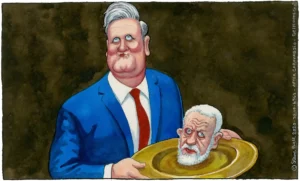
Bonus… Guardian Reprints The Independent’s Blood Libel – January 27, 2003
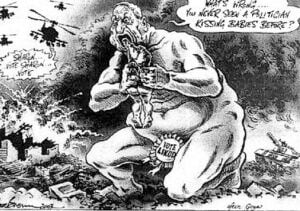
British left-wing outlet The Independent was also the subject of complaints nearly two decades ago when at the height of the Second Intifada — a campaign of Palestinian suicide bombings and attacks on Israeli civilians — the newspaper printed a grotesque cartoon of former Israeli Prime Minister Ariel Sharon eating the flesh of a Palestinian baby.
With Apache attack helicopters firing missiles in the background and blaring the message “Vote Likud,” Sharon says, “What’s wrong, you never seen a politician kissing babies before?”
Despite the Israeli government launching a formal complaint about the image, which clearly alluded to the classic blood libel that Jews prey on Christian children, The Guardian had no qualms about republishing the cartoon by Dave Brown, while simply reporting that it created a “storm of controversy.”
Liked this article? Follow HonestReporting on Twitter, Facebook, Instagram and TikTok to see even more posts and videos debunking news bias and smears, as well as other content explaining what’s really going on in Israel and the region.



